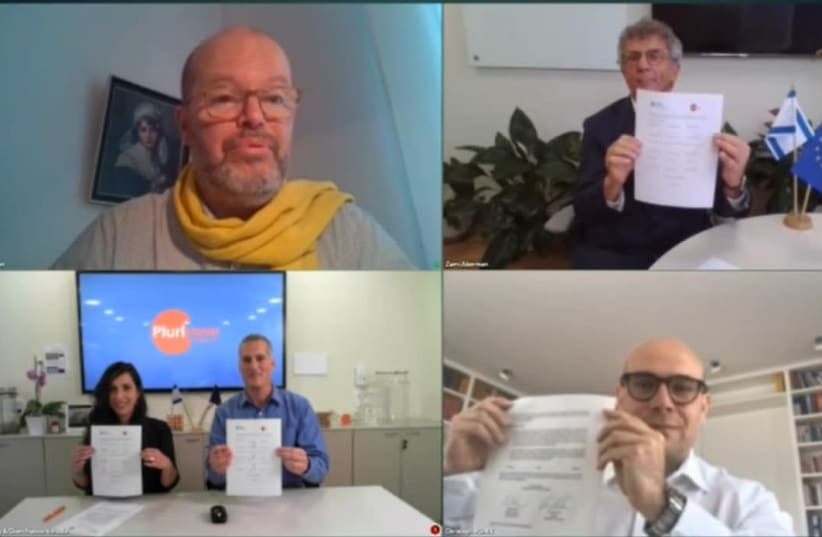The European Investment Bank (EIB) and the Israel Innovation Authority (IIA) signed a cooperation agreement on Thursday to pursue investment opportunities in the field of bio-convergence for healthcare.
Referring to the integration of biology with information technology and engineering to support public-health goals, the memorandum of understanding will enable increased financial support by the European Union for Israeli research and development.
The EIB will provide €50 million ($54m.) in financing to advance Haifa-based Pluristem’s pioneering platform for regenerative stem-cell therapy, targeting the development of therapies for COVID-19 and other unmet medical needs. It is the first financing deal within the framework of the agreement.
Encouraging preliminary data published earlier this month showed that the company’s PLX cell-therapy product had treated six critically ill coronavirus patients in Israel who were considered high risk for mortality. They all survived.
“We need to support emerging technologies,” EIB vice president Ambroise Fayolle said during an online signing ceremony for the agreement. “The focus in the MoU on bio-convergence for health is very welcome, and very relevant, because it may well be that it is indeed one of the growth engines for the future.”
Dr. Ami Appelbaum, the Economy Ministry’s chief scientist and chairman of the IIA, said Israel views bio-convergence as its “next economic growth engine,” integrating biology with engineering, AI, physics, computation, nanotechnology and material science.
“The collaboration between the European Investment Bank and the Israel Innovation Authority provides a unique opportunity to advance this area, providing companies with various financing opportunities from early stage to growth,” he said.
“As the COVID-19 pandemic spreads globally, it is of vital importance to employ cutting-edge technological innovation with global outreach to provide the much-needed relief the world is looking for,” Appelbaum said.
The deal to support Pluristem represents the first Israeli-European project guaranteed by the European Fund for Strategic Investments, the financial pillar of the EU’s investment plan for Europe. Known as the Juncker Plan, the initiative brings together the EIB and the European Commission to advance Europe’s economic competitiveness.
Pluristem, which is currently conducting late-stage clinical trials in several indications, said its placenta-based cell-therapy product candidates are believed to release a range of therapeutic proteins in response to inflammation, ischemia, muscle trauma, hematological disorders and radiation damages. Cells are grown using three-dimensional expansion technology and can be administered to patients without tissue matching.
“We are all witnessing the impact of a global pandemic,” Pluristem president and CEO Yaky Yanay said. “As much as it is taking precious human lives, it is destroying healthcare systems and economies.”
“The financing agreement provided by EIB will allow Pluristem to expedite the development plan to treat patients with complications from COVID-19,” he said. “We will not hold back any resource or effort as we push to be at the forefront of fighting this pandemic.”
Leading biotech companies should believe in their work and be extremely ambitious and optimistic, Yanay said, adding that the EIB had delivered a vote of confidence in Pluristem’s vision.
“You just gave me another 50 million reasons to make our vision a reality,” he said. “We will make it happen for the benefit of our stakeholders, for the benefit of this world and for the millions of patients across the globe who need hope.”
